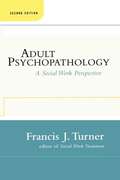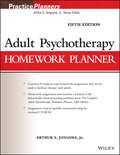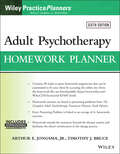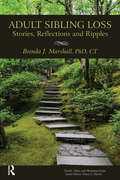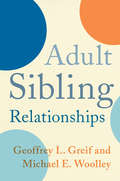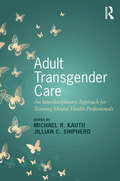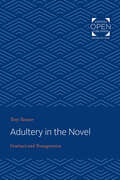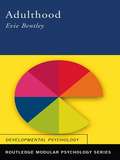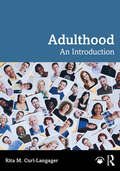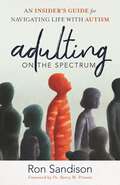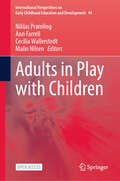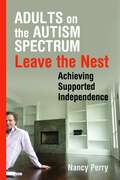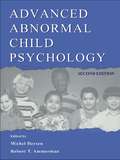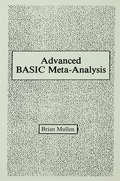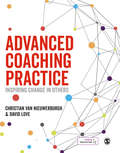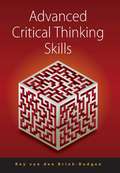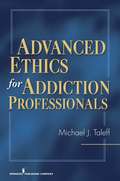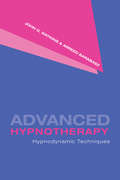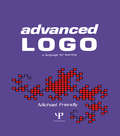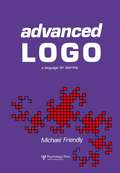- Table View
- List View
Adult Psychopathology, Second Edition
by Francis J. TurnerThe most comprehensive textbook for students in advanced social work and mental health courses is now completely revised and updated for a new generation When Adult Psychopathology: A Social Work Perspective was first published in 1984, this pioneering text was the first to conceptualize and organize theory and practice about the treatment of the mentally ill within their families and communities from a social work perspective. Now, in response to new developments in theory and research, as well as changes in service delivery within the field, the second edition contains updated and accessible information on how mental illnesses develop and how they can be treated within a social work framework that recognizes the importance of family, economics, and culture as well as biochemical and psychodynamic factors. Each chapter is written by the leading social work authority on that subject and includes practical, in-depth discussion of state-of-the-art technologies, treatments, and research. The book encompasses the broad spectrum of topics that social workers need to understand, including personality, adjustment, schizophrenia, suicide, anxiety states, phobias, neurological disorders, psychosexual disorders, drug and alcohol addiction, eating disorders, and others. Adult Psychopathology, Second Edition is essential for both M.S.W. and Ph.D. social work students and, as the authoritative, unequaled reference book, will aid clinicians in making more precise diagnoses in their daily work.
Adult Psychotherapy Homework Planner
by Arthur E. Jongsma Jr.New and updated assignments and exercises to meet the changing needs of mental health professionalsThe Adult Psychotherapy Homework Planner, Fifth Edition provides you with an array of ready-to-use, between-session assignments designed to fit virtually every therapeutic mode. This easy-to-use sourcebook features:92 ready-to-copy exercises covering the most common issues encountered by adult clients including such problems as chronic pain, family conflict, and anxietyA quick-reference format--the interactive assignments are grouped by behavioral problems including depression, low self-esteem, panic, dependency, eating disorders, and phase-of-life problemsExpert guidance on how and when to make the most efficient use of the exerciseAssignments cross-referenced to The Complete Adult Psychotherapy Treatment Planner, Fifth Edition--so you can quickly identify the right exercises for a given situation or problemA CD-ROM contains all the exercises in a word-processing format--allowing you to customize them to suit your and your clients' unique styles and needs
Adult Psychotherapy Homework Planner (PracticePlanners)
by Timothy J. Bruce Arthur E. Jongsma Jr.Facilitate your client's involvement in change with 98 ready-to-print homework assignments The newly updated Sixth Edition of the Adult Psychotherapy Homework Planner offers practitioners a wide variety of ready-to-use assignments for adult clients in almost every therapeutic mode. Designed to be used with the Complete Adult Psychotherapy Treatment Planner, Sixth Edition, this planner saves time and energy otherwise spent studying, finding, or writing custom assignments for each client. The book is organized as a quick reference, with assignments grouped by behavioral problems like depression, anxiety, eating disorders, and more. It includes expert guidance on hw and when to make the most productive use of the exercises and is extensively cross-referenced to the corresponding treatment planner. This powerful resource includes: 92 ready-to-copy, customizable homework assignments that facilitate adult therapy Cross-references for each homework assignment to presenting problems from the Complete Adult Psychotherapy Treatment Planner, Sixth Edition New downloadable assignments from a supplementary online portal New homework assignments for opiod-related disorders and clients experiencing loneliness Perfect for psychologists, therapists, counselors, social workers, and psychiatrists, the latest edition of the Adult Psychotherapy Homework Planner is an indispensable resource for any mental health professional who works with adult clients.
Adult Sibling Loss: Stories, Reflections and Ripples (Death, Value and Meaning Series)
by Brenda J. Marshall"He was my best friend." "I feel like I've lost that one person I could always count on." Siblings know each other in ways friends and other blood relatives do not. They have shared bedrooms, bathrooms, holidays, family milestones, meals, and a way of growing up that those outside the family can never fully understand. The bond is intense, complicated, sometimes difficult, often wonderful and absolutely irreplaceable. When death interrupts what might have been a lovely, lifelong connection, the impact is tremendous. And yet, this loss is rarely the focus of research and is not well understood or recognised within society, leaving many siblings searching for appropriate support and validation. This book gives readers the opportunity to experience the intensity of this relationship through the eyes of three bereaved siblings. Their experiences, both before and after loss, are powerfully presented using a narrative style that allows the complexity and depth of their individual relationships to shine brightly. The author, a bereaved sibling herself, artfully weaves her story throughout, adding to the richness of the text. Through these collective stories, readers are invited to explore their own reactions and reflect on the many ways siblings affect each other over the long term. Bereaved siblings, clinicians, medical professionals, therapists, social workers, funeral directors, religious leaders, bereavement groups, and anyone who supports or knows a bereaved sibling will find benefit in this book. This highly readable text will both touch and inform readers.
Adult Sibling Relationships
by Geoffrey Greif Michael WoolleyThe bond siblings develop in childhood may be vastly different from the relationship that evolves in adulthood. Driven by affection but also characterized by ambivalence and ambiguity, adult sibling relationships can become hurtful, uncertain, competitive, or exhausting though the undercurrents of love and loyalty remain. An approach that recognizes the positive aspects of the changing sibling relationship, as well as those that need improvement, can restore healthy ties and rebuild family closeness.With in-depth case studies of more than 260 siblings over the age of forty and interviews with experts on mental health and family interaction, this book offers vital direction for traversing the emotional terrain of adult sibling relations. It pursues a richer understanding of ambivalence, a normal though little explored feeling among siblings, and how ambiguity about the past or present can lead to miscommunication and estrangement. For both professionals and general readers, this book clarifies the most confounding elements of sibling relationships and provides specific suggestions for realizing new, productive avenues of friendship in middle and later life—skills that are particularly important for siblings who must cooperate to care for aging parents or give immediate emotional or financial support to other siblings or family members.
Adult Transgender Care: An Interdisciplinary Approach for Training Mental Health Professionals
by Michael R. Kauth and Jillian C. ShipherdAdult Transgender Care provides an overview of transgender health and offers a comprehensive approach to training mental health professionals in transgender care. The book takes an interdisciplinary approach to transgender care, emphasizing the complementary contributions of psychiatry, psychology, and social work in providing transgender care within an integrated treatment team. Included in this text are overviews of how to conceptualize and provide treatment with complex and difficult clinical presentations and considerations for understanding how to address system-level challenges to treatment. Adult Transgender Care meets a unique need by providing detailed information, clinical interventions, case studies, and resources for mental health professionals on transgender care.
Adultery in the Novel: Contract and Transgression
by Tony TannerOriginally published in 1979. Adultery is a dominant feature in chivalric literature; it becomes a major concern in Shakespeare's last plays; and it forms the central plot of novels from Anna Karenina to Couples. Tony Tanner proposes that transgressions of the marriage contract take on a special significance in the "bourgeois novels" of the eighteenth and nineteenth centuries. His interpretation begins with the general topic of adultery in literature and then zeroes in on three works—Rousseau's La Nouvelle Héloïse, Goethe's Die Wahlverwandtschaften, and Flaubert's Madame Bovary. His interpretation encompasses the role of women, the structure of the family, social mores, and the history of sexuality.
Adulthood (Routledge Modular Psychology)
by Evie BentleyAdulthood is an accessible text which deals with the vital area of adult psychological development. It combines detailed accounts of the main theories and evidence on the psychology of adulthood with thorough discussion and commentary, presented in a concise and friendly form. The book's approach encourages engagement with the main theories of this highly relevant topic, as well as including less well-known models of adulthood for discussion. The book begins with a definition of lifespan psychology, and further chapters include early and middle adulthood; the life events approach; marriage; parenting; divorce; and old age. It includes some modern slants on the classic research, as well as the up-to-date theories, and alternative theories are introduced. Cross-cultural issues and examples have been included in every chapter, and various biases are identified and explained. The final section has sample essays on this topic with extremely helpful examiner's comments, as well as a useful glossary. Evie Bentley has written an ideal guide to this topic, which requires little or no background knowledge. It provides a useful introduction for both A-level and undergraduate students of psychology or sociology, and will also be of interest to anyone in the health or social care professions and to those with a general interest in developmental psychology.
Adulthood And Aging
by Marion G. MasonFor undergraduate courses in Adulthood and Aging, Gerontology, and Adult Development. This text provides an engaging perspective on the issues, challenges, and joys of adult development and aging. It provides a balanced and integrated treatment of young, middle, and later adulthood, concluding with a discussion of life satisfaction and quality of life issues. More than ever there is a need to inform those who will be therapists, health care professionals, social workers, and all others who plan to work with adults in some capacity of the challenges and opportunities that often come our way in adulthood. In addition, this text covers areas which are often neglected, such as self development and individual differences, life-long learning, community and political life, and values and moral development. The addition of these and other topics, along with a positive-growth focused perspective sets this book apart from other textbooks in this area that have grown out of gerontology backgrounds with a focus on physical decline and illness. The pedagogical features of the book direct students to key information, and the special features engage the reader in current ethical dilemmas and life-planning issues.
Adulthood: An Introduction
by Rita M. Curl-LangagerAdulthood: An Introduction offers a thorough foundation to learn, consolidate, and apply developmental concepts and current knowledge to the psychology of adult development. It illustrates major ideas with carefully selected research that is widely referenced and topically pertinent to development in early, middle, and late adulthood.This comprehensive text reviews the five domains of development, including biological development, cognitive development, personality development, social development, and ecological influences in development. It introduces multicultural perspectives and contexts in these discussions, as well as developmental themes such as nature and nurture, early and later experiences, and the individual’s active role. Accompanied by learning objectives and section reviews, vignettes portray numerous adult experiences, and commentaries for students offer additional information and interpretation with the students’ perspectives in mind.Designed to encourage students to think critically about topics of adulthood in both academic and applied settings, Adulthood is appropriate for undergraduate students in psychology and related disciplines, such as addiction studies, speech pathology, criminal justice, nursing, and business.Combined with a complete ancillary package, the book provides activities for individuals and groups, critical thinking questions, vignette-specific questions and responses, perspectives across disciplines, and much more. Additional resources for both students and instructors are available in the book's Support Material.
Adulting on the Spectrum: An Insider's Guide for Navigating Life with Autism
by Ron Sandison"A must-read for adults with autism." —Wendela Whitcomb Marsh, author of Independent Living with Autism Independent adult life is hard. Add the challenges that come with neurodiversity, and adulting can feel nearly impossible—unless you’ve got the right tools. As a young person with autism, Ron Sandison navigated into independent adult life through painful trial and error. But with perseverance he found his own path to success, earning a master's degree, building a family, and enjoying a career in the medical field and academia. In Adulting on the Spectrum, he empowers you with the lessons he's learned, such as how to build and maintain friendships have a healthy and hygienic lifestyle avoid the pitfalls of dating manage emotions and sensory issues Filled with inspiring accounts from individuals with autism who have achieved their goals and with Ron's faith journey sprinkled throughout, this unique and realistic guide features easy-to-follow instructional teaching, reflective questions, and fun activities. It is designed to ease the transition to adulthood and help manage the nuanced aspects of life with autism.
Adults in Play with Children (International Perspectives on Early Childhood Education and Development #44)
by Niklas Pramling Ann Farrell Cecilia Wallerstedt Malin NilsenThis is an Open access book.This work addresses the presence and participation of adults in play with children. Rather than discussing this issue on ideological ground, the international contributions build on empirical data and report research conducted in many different contexts and settings around the world. Responding to the many forms it takes, play is defined from different theoretical points of view. Amongst the topics addressed in the chapters are the ethics of participation, play with refugee children, democracy and play, multilingualism in play, development of play and imagination. For knowledge building on children&’s lives, childhoods and early childhood education and care, it is important to develop empirically and theoretically what processes come into play when children and adults play together, whether in play initiated and framed by adults or play initiated by children and to which adults try to gain entry. Primarily intended for researchers interested in play and intergenerational communication, the book is also valuable for professionals working with children in different kinds of early childhood settings.
Adults on the Autism Spectrum Leave the Nest: Achieving Supported Independence
by Nancy PerryChildren on the Autism Spectrum often grow up to find they are unable to cope effectively with the challenges of adult life. This book shows that, with the appropriate lifelong care from parents and carers, it is possible for those with neurodevelopmental disabilities to achieve supported independence and live fulfilling adult lives. Adults on the Autism Spectrum Leave the Nest provides a guide for parents on how to prepare their children for adulthood, and describes in detail the kinds of services people with Autism Spectrum Disorders (ASDs) need in order to live independently, away from the parental home. The author explains the importance of the cognitive abilities that enable us to regulate behaviour and adapt to changing situations, known as Executive Functions, and how an individual's deficits in this area can be especially problematic in the adult world. The book provides approaches to managing Executive Function Deficits and describes an innovative therapeutic program that successfully allows adults with ASDs to live with their peers and develop meaningful adult relationships. This book provides practical and accessible guidance for parents, therapists, people with ASDs, and anyone with an interest in helping people on the Autism Spectrum lead their lives with a sense of dignity and independence.
Advanced Abnormal Child Psychology
by Michel Hersen Robert T. AmmermanThere was a time when abnormal child psychology was the stepchild of abnormal psychology, with perhaps one or two chapters in an entire advanced textbook devoted to children. Given the explosive amount of new research on child development in general since the 1980s, "stepchild" is obviously no longer a valid characterization. Indeed, in the last 15 years, many new journals devoted to childhood problems have made their appearance on library bookshelves. The first edition of this book was assembled in an effort to integrate the empirical and clinical literatures and show the advanced undergraduate and beginning graduate student the breadth and depth of our existing knowledge about the disorders that manifest themselves early in development. Now, since its publication in 1995, a great deal more work has been done. This revised and expanded second edition includes much new material from the first edition authors and from several new ones, all respected experts in the field. Part I offers an overview. It outlines: *historical developments with documentation of the neglect and abuse that children suffered at the hands of society well into the 20th century; *developmental psychopathology as a theoretical framework to guide research and clinical efforts; *psychophysiological determinants of behavior, with special attention focused on childhood autism, and attention deficit and antisocial conduct disorders; *theoretical, methodological, and practical considerations involved in determining investigatory paths including sampling, design selection, measurement, data analysis, and pragmatics; and *the reactions of children, families, and society to complex and diverse child health problems. Part II addresses assessment and treatment issues. It discusses: *behavioral treatment of childhood disorders and multiple case examples of commonly used techniques; *new developments in pharmacological treatment and sound guidelines for the consideration of pharmacotherapy; and *formulations and a review of preventive interventions. Part III examines specific disorders of childhood and adolescence. It discusses: *anxiety disorders, affective and mood disorders, mental retardation, autism, specific developmental disorders, conduct disorder, attention-deficit hyperactivity disorder (ADHD), and eating disorders; *psychological aspects of pediatric disorders--interventions tailored to the needs of the child and family to maximize adaptation and recovery; and *substance use disorders--ranging from models emphasizing social influences to those focusing on biological vulnerabilities. Each chapter in Part III has an identical structure--clinical description, causes, course, familial contributions, psychological and genetic influences, current treatments, summary--and includes numerous case illustrations.
Advanced Acceptance and Commitment Therapy: The Experienced Practitioner’s Guide to Optimizing Delivery
by Darrah WestrupIn Advanced Acceptance and Commitment Therapy, a licensed clinical psychologist and renowned ACT expert presents the first advanced ACT book for use in client sessions. Inside, readers will hone their understanding of the core processes behind ACT and learn practical strategies for moving past common barriers that can present during therapy, such as over-identifying with clients or difficulty putting theory into practice.
Advanced Basic Meta-analysis: Version 1.10
by Brian MullenIn response to the growing emphasis on precision in the summarization and integration of research literature, Advanced BASIC Meta-Analysis presents an overview of strategies, techniques, and procedures used in meta-analysis. The book and software provide an integrated and comprehensive combination of meta-analytic tools for the statistical integration of independent study results. Advanced BASIC Meta-Analysis has three distinct goals: * to provide a clear and user-friendly introduction to the procedures and rules of effective meta-analytic integration; * to present the implicit assumptions and strategies that guide successful meta-analytic integrations; and * to develop a meta-analytic database management system that allows users to create, modify, and update a database, including the relevant statistical information and predictors, for a given research domain. The companion software system allows users to perform a full complement of meta-analytic statistical functions with the speed and flexibility of a database management system. It can also construct a wide array of meta-analytic graphic displays. This text and software package serves as a useful introduction to the quantitative assessment of research domains for those new to meta-analyses. It is also a valuable sourcebook for those who have already conducted meta-analyses.
Advanced Brief Strategic Therapy for Young People with Anorexia Nervosa: An Effective Guide for Clinicians
by Giorgio Nardone Elisa ValteroniThis important new book details a strategic and systemic model for short-term therapy with adolescent sufferers of anorexia nervosa, a psychopathology that seduces patients into starvation as doctors and family look on with increasing desperation. Supported by the successful treatment of hundreds of cases over the past 30 years, the book is the culmination of a long-term intervention programme developed at the Strategic Therapy Centre of Arezzo, Italy. It begins by outlining the range of different eating disorders, before identifying the specific characteristics that adolescents with anorexia present. The variations of the pathology are then discussed. Not all patients present with the same symptoms; some sufferers over-exercise while others binge eat or self-harm. Substance abuse is also common, either with diuretics or chemicals; others self-induce vomiting. The therapeutic strategy will, of course, differ for each patient. Accessibly written throughout, the book concludes with two cases studies – complete with full transcripts – which illustrate the therapeutic process that allowed the patient to change their patterns of thinking, and the accompanying behaviours. An insightful and invaluable work on this vital topic, the book will be essential reading for any professional working with adolescents presenting with anorexia, as well as the families of sufferers.
Advanced Coaching Practice: Inspiring Change in Others
by David Love Dr. Christian van NieuwerburghHighly respected coaches Christian van Nieuwerburgh and David Love help you to develop your coaching practice, bridging the gap between beginner and advanced coach. You’ll have access to 15 videos that illustrate and analyse the book’s key themes, helping you to extend your learning and enhance your reflective practice, allowing you a rare extra insight into the coaching conversation. This is a must-read for trainees at the later stages of a coaching qualification, and experienced practitioners looking to broaden and develop their practice. A note to customers: Those purchasing a physical copy of the book will have an access code that allows you to access the video content. Those purchasing an ecopy will need to email digitalcontent@sagepub.co.uk with 'ACCESS CODE REQUIRED' in the subject line to request your access code. Please remember to indicate that this is for van Nieuwerburgh & Love 'Advanced Coaching Practice'
Advanced Coaching Practice: Inspiring Change in Others
by David Love Dr. Christian van NieuwerburghHighly respected coaches Christian van Nieuwerburgh and David Love help you to develop your coaching practice, bridging the gap between beginner and advanced coach. You’ll have access to 15 videos that illustrate and analyse the book’s key themes, helping you to extend your learning and enhance your reflective practice, allowing you a rare extra insight into the coaching conversation. This is a must-read for trainees at the later stages of a coaching qualification, and experienced practitioners looking to broaden and develop their practice. A note to customers: Those purchasing a physical copy of the book will have an access code that allows you to access the video content. Those purchasing an ecopy will need to email digitalcontent@sagepub.co.uk with 'ACCESS CODE REQUIRED' in the subject line to request your access code. Please remember to indicate that this is for van Nieuwerburgh & Love 'Advanced Coaching Practice'
Advanced Critical Thinking Skills
by Roy Van Den Brink-BudgenThis book takes the skills introduced in Roy van den Brink-Budgen's bestselling book Critical Thinking for Students and extends and builds on them. As a result, it will be especially useful for students on advanced level courses, whether in schools, colleges, or universities. It shows how complex arguments can be built up, analysed, and evaluated. It also shows how the use of various types of claim can be approached in argument, by stressing the need to ask a series of questions about their possible significance. The frequent role of explanation in the drawing of inference is also detailed. In addition, it applies Critical Thinking skills to decision-making, showing how these skills can clarify the choices available, their possible consequences, and the criteria needed to make decisions. In short, this book shows how to become an even more active and effective Critical Thinker.
Advanced Critical Thinking Skills
by Roy Van Den Brink-BudgenThis book takes the skills introduced in Roy van den Brink-Budgen's bestselling book Critical Thinking for Students and extends and builds on them. As a result, it will be especially useful for students on advanced level courses, whether in schools, colleges, or universities. It shows how complex arguments can be built up, analysed, and evaluated. It also shows how the use of various types of claim can be approached in argument, by stressing the need to ask a series of questions about their possible significance. The frequent role of explanation in the drawing of inference is also detailed. In addition, it applies Critical Thinking skills to decision-making, showing how these skills can clarify the choices available, their possible consequences, and the criteria needed to make decisions. In short, this book shows how to become an even more active and effective Critical Thinker.
Advanced Ethics for Addiction Professionals
by Michael J. Taleff<p>Ethical decision-making is required in many of the difficult situations faced by addiction professionals. In this guide, Michael Taleff describes how to integrate critical thinking with ethical decision-making. This is a guide not on "what to do" when confronted with difficult ethical dilemmas, but on how to think about what to do. <p>The author presents common ethical dilemmas that addiction professionals face in their daily work--such as boundary issues, confidentiality, dual relationships, and more--and asks readers to consider their own responses to these dilemmas. The book then shows readers how to apply new models of ethical thinking to practice. <p>Key features: <p> <li>Presents an ethical self-exam to encourage critical thinking about one's own decision-making method <li>Introduces a variety of models such as the social contract theory, existentialist theory, and ethical egoism <li>Discusses how biases, emotional reactions, and fallacies can weaken ethical decision-making <li>Presents an introductory "Ethics Judgment Kit," a simple, practical decision-making procedure for students <p> <p>This book demonstrates how critical thinking skills can impact and improve the process of ethical decision-making.
Advanced Hypnotherapy: Hypnodynamic Techniques
by John G. Watkins Arreed BarabaszThis book focuses on tested hypnoanalytic techniques, with step-by-step procedures for integrating hypnosis into psychoanalytic processes. In its examination of the latest thinking, research, and techniques, the book discusses historical origins of hypnosis as well as how to apply it to current events, such as using hypnosis in the treatment of trauma with soldiers coming out of the war in Iraq. The text shows how hypnosis can be combined with psychoanalysis to make it possible to understand the subjective world of clients. Its accessible nature, rich detail, and significant updates make the book an invaluable resource for the professional who wishes to incorporate hypnosis into his or her practice. With the authors’ extensive and impressive knowledge, careful updates, and comprehensive coverage of the proper and appropriate techniques to use, this volume is an indispensable addition to the field.
Advanced Logo: A Language for Learning (Computer Science for the Behavioral Sciences Series)
by Michael FriendlyAdvanced Logo shows how LOGO can be used as a vehicle to promote problem solving skills among secondary students, college students, and instructors. The book demonstrates the wide range of educational domains that can be explored through LOGO including generative grammars, physical laws of motion and mechanics, artificial intelligence, robotics, and calculus.
Advanced Logo: A Language for Learning (Computer Science for the Behavioral Sciences Series)
by Michael FriendlyAdvanced Logo shows how LOGO can be used as a vehicle to promote problem solving skills among secondary students, college students, and instructors. The book demonstrates the wide range of educational domains that can be explored through LOGO including generative grammars, physical laws of motion and mechanics, artificial intelligence, robotics, and calculus.
